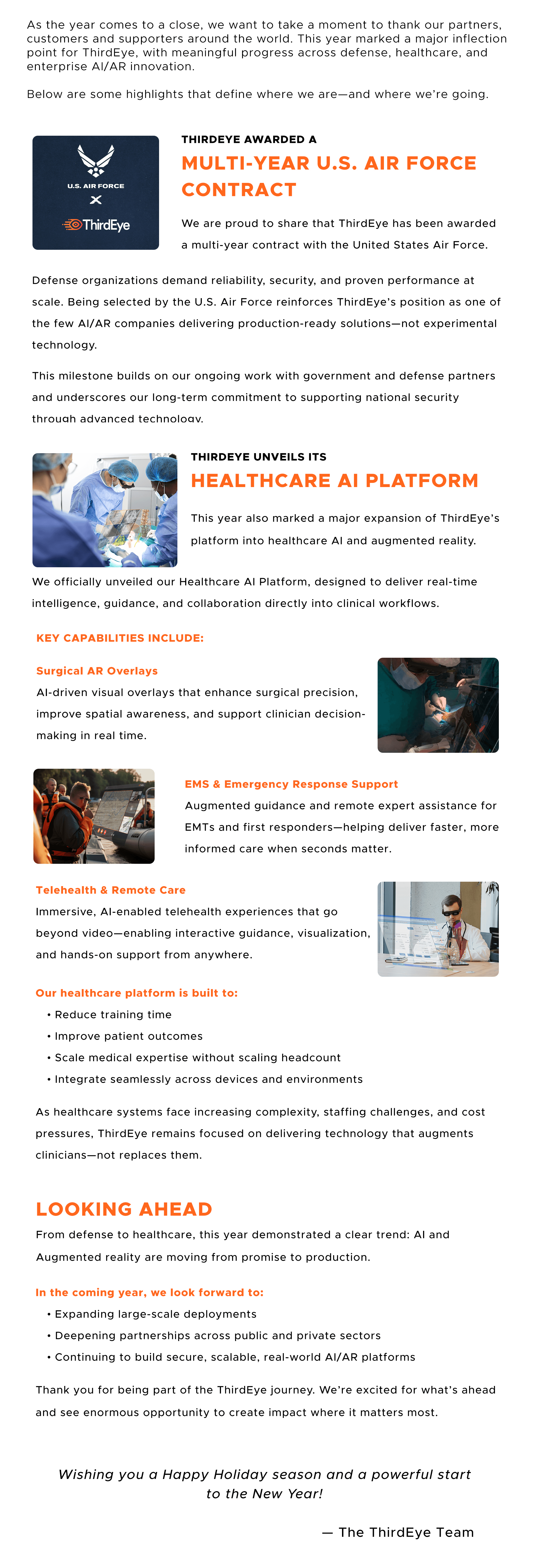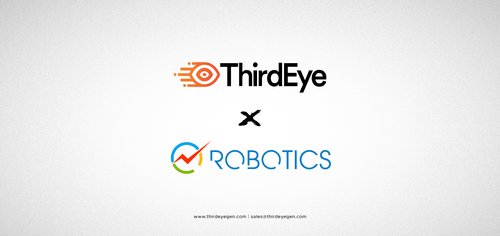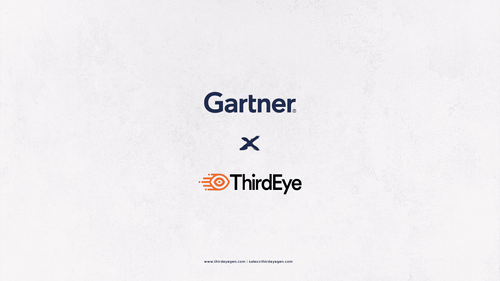
Happy Holidays & New Year from ThirdEye!
December 27, 2025



ThirdEye is excited to announce a new partnership with Oz Robotics, expanding opportunities to bring innovative AR and mixed reality solutions to broader technology and enterprise audiences.
This collaboration supports ThirdEye’s mission to make advanced AR tools more accessible across industries such as field service, healthcare, training, defense, and industrial operations. By partnering with Oz Robotics, ThirdEye strengthens its presence within global emerging-technology markets and aligns with a platform known for supporting cutting-edge products in robotics, AI, and engineering.
We look forward to continued collaboration with Oz Robotics as we work together to drive the future of immersive technology and deliver impactful solutions to customers worldwide.
About Oz Robotics
Oz Robotics is a global marketplace and technology platform focused on robotics, AI, automation, and emerging hardware solutions. The company partners with innovators worldwide to bring advanced technology products to consumers, developers, enterprises, and STEM organizations through a trusted online distribution and partner ecosystem.
About ThirdEye
ThirdEye has developed a comprehensive AR/MR digital ecosystem that combines proprietary hardware and AI-powered software, optimized for government and enterprise deployment. The company is led by a senior team with over 25 years of experience delivering next-generation defense products. With a proven track record of deploying mission-critical solutions, ThirdEye is gaining traction across defense, aerospace, medical, telecom, automotive, construction, and energy sectors—positioning it for continued expansion across high-growth global markets.
Learn more: www.thirdeyegen.com
Media Contact: sales@thirdeyegen.com

At ThirdEye Gen, we build advanced AR/AI systems for defense and enterprise. That mission demands teams who think clearly under pressure, solve hard problems in ambiguous environments, and obsess over outcomes—not optics. Veterans do exactly that. It’s why we’re doubling down on veteran hiring across engineering, product, operations, field support, and leadership.
“When you’re shipping tech that impacts service members and first responders, you don’t guess at requirements—you live them. Veterans help us design what the mission actually needs.” - ThirdEye Leadership.
The Fit: Defense DNA + Veteran Experience
ThirdEye’s roots are in defense and dual-use innovation—building ruggedized AR/MR hardware and AI software that can survive the field and scale to the enterprise. Veterans bring:
Operational insight: They translate real-world constraints (time, spectrum, comms, SWaP, safety) into product realities.
Standards fluency: Many have hands-on familiarity with MIL-STD testing, cybersecurity controls, and secure workflows.
Team of teams mindset: Mission planning, cross-functional execution, debrief, iterate—veterans institutionalize this loop.
Calm under pressure: Live deployments, tight windows, and high-stakes demos feel familiar, not foreign.
Where Veterans Thrive at ThirdEye
AR/AI Engineering & Integration: Help train and harden models, optimize on-device performance, and integrate sensors into workflows used by defense, public safety, and industrial clients.
Field Solutions & Customer Success: Deploy and support our systems for DoD and allied partners; translate feedback into product changes quickly.
Security & Compliance: Support secure development, export controls, STIGs, and compliance programs (e.g., NIST/CMMC) that keep our products deployment-ready.
Operations & Supply Chain: Apply logistics discipline to manage long-lead components, quality, and readiness—without slowing innovation.
Built for the Field, and the People in It
ThirdEye’s products are designed with end-users in mind: service members, first responders, and operators who deserve tools that just work. Veterans help us keep that promise by pressure-testing:
Ergonomics & durability: Comfort and reliability across long wear, heat, and harsh environments.
Cognitive load: Interfaces that enhance focus, not distract from it—hands-free, glanceable, low-friction.
Speed to value: Rapid setup, offline resilience, and clear failure modes that operators can trust.
Security by design: Data minimization, least privilege, and secure update paths—because security is part of usability.
A Culture That Respects Service and Performance
We’re mission-driven, data-driven, and low-ego. That shows up in how we operate:
Clear objectives, fast feedback: We publish goals, measure what matters, and iterate.
Ownership: Small teams, high autonomy, and support to ship.
Growth path: Technical and leadership tracks with transparent expectations.
Benefits that matter: Competitive comp, equity participation, flexible time, and support for reservists/guard obligations.
Join Us!
If you’re a veteran, or know one, who’s looking to build technology that serves people on the front lines, we’d love to talk. Bring your experience. We’ll bring the mission, the tools, and the team.
Apply: thirdeyegen.com/careers
Questions: careers@thirdeyegen.com

ThirdEye Gen has been recognized as a representative vendor in Gartner’s newly released Hype Cycle for User Experience, 2025. This recognition highlights our leadership in the industry, our commitment to innovation, and our proven ability to deliver real value to customers. Being named in this influential report reinforces our mission to shape the future of user experience through cutting-edge technology and solutions.
About ThirdEye
ThirdEye has developed a comprehensive AR/MR digital ecosystem that combines proprietary hardware and AI-powered software, optimized for government and enterprise deployment. The company is led by a senior team with over 25 years of experience delivering next-generation defense products. With a proven track record of deploying mission-critical solutions, ThirdEye is gaining traction across defense, aerospace, medical, telecom, automotive, construction, and energy sectors—positioning it for continued expansion across high-growth global markets.
About Gartner
Gartner is a leading global research and advisory firm that provides insights, advice, and tools for leaders in various fields, including IT, finance, HR, and customer service. Founded in 1979, it helps clients make informed decisions through data analysis, market research, and consulting services. Gartner is publicly traded on the New York Stock Exchange under the symbol IT.
Learn more: www.thirdeyegen.com
Media Contact: sales@thirdeyegen.com

PRINCETON, NJ – June 4, 2025 – ThirdEye, a fast-growing company specializing in augmented reality and artificial intelligence (AR/AI) solutions for defense, emergency response, and enterprise markets, announced today it has been awarded a contract by the U.S. Department of the Air Force to develop the Modular Integrated Display Augmentation System (MIDAS)—a next-generation AR heads-up display designed specifically for use in Chemical, Biological, Radiological, Nuclear, and Explosive operational environments.
As part of a broader U.S. Department of Defense (DoD) initiative, MIDAS addresses a critical capability gap by allowing Special Warfare Operators and other frontline personnel to maintain full situational awareness (SA) while wearing Mission-Oriented Protective Posture gear. The hands-free solution overlays real-time data directly in the user’s field of view, eliminating reliance on handheld devices when gloves, masks, and suits limit accessibility.
“MIDAS redefines how warfighters and frontline responders operate in high-threat environments,” said Nick Cherukuri, CEO of ThirdEye. “This is more than an AR headset—it’s a mission-critical solution that delivers real-time intelligence while preserving the full protective integrity of the gear. It marks a major milestone in our mission to equip those who serve in the world’s most challenging conditions.”
MIDAS features a monocular, transparent AR display integrated into standard protective masks, helmet visors, dive masks, and ballistic eyewear. This allows for unobtrusive visual overlays without obstructing natural vision. A proprietary contactless power and data bridge transmits HD video and power through non-conductive surfaces, preserving the protective seal and integrity of the gear. The system supports direct display of ATAK/SWAK mission systems, empowering operators to make rapid, informed decisions in dynamic environments. Its modular architecture ensures adaptability across a wide range of DoD and commercial personal protective equipment (PPE) platforms.
While MIDAS is developed for defense, its commercial potential is equally compelling. First responders—firefighters, rescue teams, and hazmat units—can use it to access building layouts, hazard alerts, escape routes, and team coordination tools in real time. In industries such as energy, oil & gas, and manufacturing, MIDAS enables workers in PPE to view diagnostics, instructions, or receive remote support—boosting safety, precision, and operational efficiency.
With a rugged, scalable design and cost-effective integration into existing protective gear, MIDAS is poised to transform field operations across military and industrial domains. Backed by DoD funding and growing market demand, ThirdEye is launching pilot programs with key first responder and industrial partners to accelerate adoption and drive scalable growth.
About ThirdEye
ThirdEye has developed a comprehensive AR/MR digital ecosystem that combines proprietary hardware and AI-powered software, optimized for government and enterprise deployment. The company is led by a senior team with over 25 years of experience delivering next-generation defense products. With a proven track record of deploying mission-critical solutions, ThirdEye is gaining traction across defense, aerospace, medical, telecom, automotive, construction, and energy sectors—positioning it for continued expansion across high-growth global markets.
Learn more: www.thirdeyegen.com
Media Contact: sales@thirdeyegen.com

In a bold move redefining enterprise and defense augmented reality, ThirdEye has officially launched a major upgrade to its AI/AR software ecosystem — transforming it into a comprehensive, unified no-code platform. Designed to empower organizations across industries like field services, healthcare, defense, and manufacturing, this upgrade consolidates ThirdEye’s industry-leading features into one intelligent, scalable solution.
As organizations seek smarter, faster ways to digitize their workflows, the demand for seamless AR and AI integration has never been greater. ThirdEye’s latest software release answers that call with:
No-Code App Creation Suite – Anyone, regardless of technical background, can now rapidly build, deploy, and customize AR workflows tailored to their organization’s needs — no developer required.
Cross-Device Compatibility – Build once, deploy everywhere. The platform now supports native use across ThirdEye’s mixed reality glasses, mobile devices, tablets, and web dashboards.
AI-Powered Remote Assistance – Enhanced real-time support with computer vision object recognition, auto-transcription, translation, and dynamic annotations — boosting field efficiency and reducing downtime.
Integrated CRM & Task Workflow Engine – Assign, track, and optimize tasks directly within AR environments. Ideal for large field teams and mission-critical scenarios.
HoloEye AI Integration – Native access to HoloEye, ThirdEye’s AI hologram system, enables users to create and deploy intelligent AR holograms for training, simulation, and guided instructions.
Unified Experience – No more stitching together fragmented AR tools. ThirdEye now delivers an all-in-one ecosystem, streamlining implementation, training, and scaling.
Lower Cost vs. Competitors – Compared to platforms like Unity or custom-built stacks, ThirdEye’s no-code environment significantly reduces total cost of ownership, with faster deployment and less overhead.
Built for Enterprise & Defense-Grade Use – Features like secure login, offline mode, and DoD-compliant architecture make ThirdEye ideal for security-critical environments.
Military & Defense Training – Deploy immersive AR combat simulations with real-time data feedback and mission replay — all without writing a line of code.
Field Service Automation – Scan complex machinery, overlay guided instructions, and monitor technician performance through integrated CRM and analytics.
Healthcare Remote Collaboration – Surgeons, nurses, and EMS personnel can collaborate hands-free using AI-guided procedures in real time.
Manufacturing & Inspection – Automate quality control with digital twins, remote audits, and real-time defect detection through AI-enhanced AR overlays.
With this upgrade, ThirdEye moves closer to its mission of making augmented intelligence accessible and actionable for every organization. Whether you’re advancing the future of defense training or transforming frontline operations, this platform gives you the tools to scale — fast.
To learn more or schedule a demo, visit www.thirdEyegen.com or contact sales@thirdeyegen.com.
About ThirdEye Gen
ThirdEye is a leader in smart glasses and AR/MR software development. Its X Series Mixed Reality Glasses and ThirdEye Workspace App software platforms are being used by organizations around the world. Mixed reality glasses bring about a new era of hands-free human interaction by directly interacting with surrounding objects through the Internet of Things (IoT) or placing digital information directly into your field of view. While many companies use only smart glasses or software today, ThirdEye provides a full end-to-end package for its customers and employees. It has hundreds of software developers creating apps ranging from games to entertainment to enterprise applications, and its products are sold around the world. From everyday consumers to Fortune 500 companies, ThirdEye is bringing the power of mixed reality everywhere. Mixed reality can potentially change how the world operates, and ThirdEye's vision is to help generate the future.
#ThirdEyeGen #AI #AugmentedReality #DigitalTransformation #RemoteAssistance #NoCode #EnterpriseAR #SmartGlasses #HoloEyeAI

About ThirdEye Gen
ThirdEye is a leader in smart glasses and AR/MR software development. Its X Series Mixed Reality Glasses and ThirdEye Workspace App software platforms are being used by organizations around the world. Mixed reality glasses bring about a new era of hands-free human interaction by directly interacting with surrounding objects through the Internet of Things (IoT) or placing digital information directly into your field of view. While many companies use only smart glasses or software today, ThirdEye provides a full end-to-end package for its customers and employees. It has hundreds of software developers creating apps ranging from games to entertainment to enterprise applications, and its products are sold around the world. From everyday consumers to Fortune 500 companies, ThirdEye is bringing the power of mixed reality everywhere. Mixed reality can potentially change how the world operates, and ThirdEye's vision is to help generate the future.
#ThirdEyeGen #VisionaryAward #TeamSpotlight #ARLeaders #InnovationInAction #AugmentedReality #AI #smartglasses #technology

l
About ThirdEye Gen
ThirdEye is a leader in smart glasses and AR/MR software development. Its X Series Mixed Reality Glasses and ThirdEye Workspace App software platforms are being used by organizations around the world. Mixed reality glasses bring about a new era of hands-free human interaction by directly interacting with surrounding objects through the Internet of Things (IoT) or placing digital information directly into your field of view. While many companies use only smart glasses or software today, ThirdEye provides a full end-to-end package for its customers and employees. It has hundreds of software developers creating apps ranging from games to entertainment to enterprise applications and its products retail around the world. From everyday consumers to Fortune 500 companies, ThirdEye is bringing the power of mixed reality everywhere. Mixed reality can potentially change how the world operates, and ThirdEye's vision is to help generate the future.
#AugmentedReality #AI #RealEye #ThirdEyeGen #smartglasses #technology #ExceedDOO #Partnership

l
About ThirdEye Gen
ThirdEye is a leader in smart glasses and AR/MR software development. Its X Series Mixed Reality Glasses and ThirdEye Workspace App software platforms are being used by organizations around the world. Mixed reality glasses bring about a new era of hands-free human interaction by directly interacting with surrounding objects through the Internet of Things (IoT) or placing digital information directly into your field of view. While many companies use only smart glasses or software today, ThirdEye provides a full end-to-end package for its customers and employees. It has hundreds of software developers creating apps ranging from games to entertainment to enterprise applications and its products retail around the world. From everyday consumers to Fortune 500 companies, ThirdEye is bringing the power of mixed reality everywhere. Mixed reality can potentially change how the world operates, and ThirdEye's vision is to help generate the future.
#AugmentedReality #AI #RealEye #ThirdEyeGen #smartglasses #technology #A3MProjekt #SoftwareDevelopment

l
About ThirdEye Gen
ThirdEye is a leader in smart glasses and AR/MR software development. Its X Series Mixed Reality Glasses and ThirdEye Workspace App software platforms are being used by organizations around the world. Mixed reality glasses bring about a new era of hands-free human interaction by directly interacting with surrounding objects through the Internet of Things (IoT) or placing digital information directly into your field of view. While many companies use only smart glasses or software today, ThirdEye provides a full end-to-end package for its customers and employees. It has hundreds of software developers creating apps ranging from games to entertainment to enterprise applications and its products retail around the world. From everyday consumers to Fortune 500 companies, ThirdEye is bringing the power of mixed reality everywhere. Mixed reality can potentially change how the world operates, and ThirdEye's vision is to help generate the future.
#AugmentedReality #AI #RealEye #ThirdEyeGen #smartglasses #technology #Defense #WhiteHouse #US #MilitaryDefense

l
About ThirdEye Gen
ThirdEye is a leader in smart glasses and AR/MR software development. Its X Series Mixed Reality Glasses and ThirdEye Workspace App software platforms are being used by organizations around the world. Mixed reality glasses bring about a new era of hands-free human interaction by directly interacting with surrounding objects through the Internet of Things (IoT) or placing digital information directly into your field of view. While many companies use only smart glasses or software today, ThirdEye provides a full end-to-end package for its customers and employees. It has hundreds of software developers creating apps ranging from games to entertainment to enterprise applications and its products retail around the world. From everyday consumers to Fortune 500 companies, ThirdEye is bringing the power of mixed reality everywhere. Mixed reality can potentially change how the world operates, and ThirdEye's vision is to help generate the future.
#AugmentedReality #AI #RealEye #ThirdEyeGen #smartglasses #technology #Defense #Turkey #Azerbaijan #MilitaryDefense

l
About ThirdEye Gen
ThirdEye is a leader in smart glasses and AR/MR software development. Its X Series Mixed Reality Glasses and ThirdEye Workspace App software platforms are being used by organizations around the world. Mixed reality glasses bring about a new era of hands-free human interaction by directly interacting with surrounding objects through the Internet of Things (IoT) or placing digital information directly into your field of view. While many companies use only smart glasses or software today, ThirdEye provides a full end-to-end package for its customers and employees. It has hundreds of software developers creating apps ranging from games to entertainment to enterprise applications and its products retail around the world. From everyday consumers to Fortune 500 companies, ThirdEye is bringing the power of mixed reality everywhere. Mixed reality can potentially change how the world operates, and ThirdEye's vision is to help generate the future.
#AugmentedReality #AI #RealEye #ThirdEyeGen #smartglasses #technology #TopCEO #BusinessMagazine